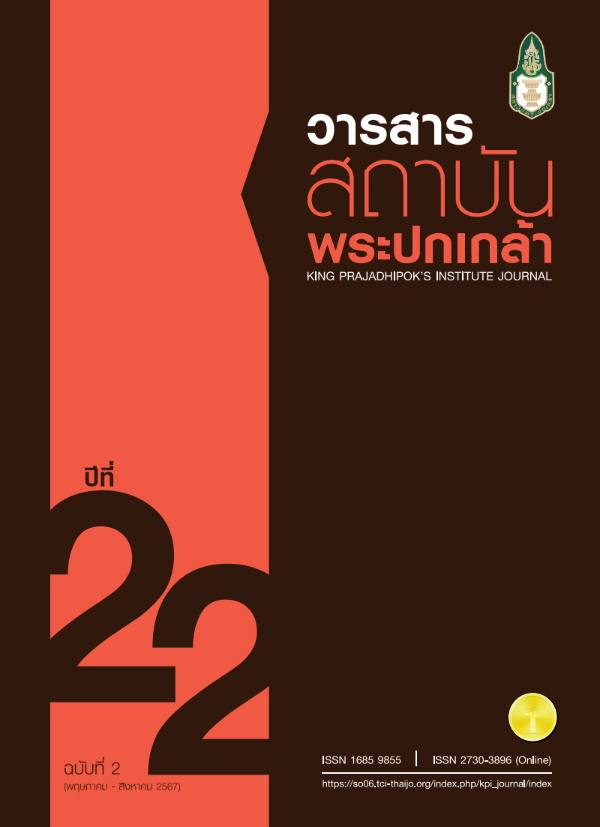Empowering Community Resilience and the "Public Sphere" Mechanism at the Provincial Level: Thailand’s Leverage Point
Main Article Content
Abstract
The “public sphere” or “public space” is an inclusive platform that provides opportunities for individuals in society to express themselves as “citizens” and to engage in public life, allowing them to present their demands to the state. Communities, community organizations, and civil societies that have effectively addressed issues have established a “public sphere” to manage conflicts in resource allocation, developmental inequality, and other challenging issues. Therefore, the “public sphere” functions as both a tool and a mechanism for effective community self-management, which can be categorized into two aspects: (a) strong communities with self-management practices on various issues, and (b) strong communities with provincial-level integration.
Building strong communities and a “public sphere” at the provincial level is crucial for mitigating inequality within the Thai social structure, particularly within the government sector, including central, regional, local, and community government agencies. The most crucial aspect of rebalancing power relations involves adopting deliberative democracy as a tool to foster community participation and empower communities to influence the direction of development in their respective areas. It is essential to further develop the Rules of the Office of the Prime Minister for Promoting Strong Communities (year…) to serve as a guiding framework for communities and provinces in constructing the “public sphere” in their areas in the future.
Article Details

This work is licensed under a Creative Commons Attribution-NonCommercial-NoDerivatives 4.0 International License.
@ 2020 King Prajadhipok's Institute The Government Complex Commemorating All Right Reserved.
References
ภาษาไทย
โกวิทย์ พวงงาม. (2562). การจัดการตนเองของชุมชนและท้องถิ่น. (พิมพ์ครั้งที่ 2). นนทบุรี: ธรรมสาร.
คณะกรรมการปฏิรูป. (2554). แนวทางการปฏิรูปประเทศไทย ข้อเสนอต่อพรรคการเมืองและผู้มีสิทธิเลือกตั้ง. กรุงเทพฯ: สำนักงานปฏิรูป.
คณะกรรมาธิการยกร่างรัฐธรรมนูญ. (ม.ป.ป.). ร่างรัฐธรรมนูญแห่งราชอาณาจักรไทย. กรุงเทพฯ: สำนักงานเลขาธิการสภาผู้แทนราษฎร.
บรรเจิด สิงคะเนติ. (2565). นวัตกรรมชุมชนเข้มแข็ง รากฐานประชาธิปไตยอัตลักษณ์ไทย. กรุงเทพฯ: โรงพิมพ์เดือนตุลาคม.
บรรเจิด สิงคะเนติ และคณะ. (2562). บทบาทและอำนาจหน้าที่ขององค์กรปกครองส่วนท้องถิ่นในทศวรรษหน้ากับความเปลี่ยนแปลงของสังคม เศรษฐกิจและการเมือง (รายงานวิจัย). กรุงเทพฯ: สำนักงาคณะกรรมการส่งเสริมวิทยาศาสตร์ วิจัยและนวัตกรรม (สกสว.).
ประภาส ปิ่นตบแต่ง และคณะ. (2565). การพัฒนาชุมชนเข้มแข็ง พึ่งพาตนเองและเท่าทันต่อการเปลี่ยนแปลงโดยอาศัยการดำเนินงานอย่างบูรณาการ. กรุงเทพฯ: สถาบันพัฒนาองค์กรชุมชน (องค์การมหาชน).
พรอัมรินทร์ พรหมเกิด. (2566). สังคมวิทยาการเมือง. (พิมพ์ครั้งที่ 3). ขอนแก่น: มหาวิทยาลัยขอนแก่น.
ไมตรี จงไกรจักร และปัณฑิตา จันทร์อร่าม (บ.ก.). (2561). พังงาแห่งความสุข...สุขที่คุณสัมผัส. นนทบุรี: โครงการผู้นำแห่งอนาคต คณะวิทยาการเรียนรู้และศึกษาศาสตร์ มหาวิทยาลัย ธรรมศาสตร์ และสำนักงานกองทุนสนับสนุนการสร้างเสริมสุขภาพ (สสส.).
สถาบันอาศรมศิลป์. (ม.ป.ป.). ผังยุทธศาสตร์การพัฒนาจังหวัดพังงา กระบวนการร่วมกำหนดทิศทางการพัฒนาสู่พังงาแห่งความสุข. ม.ป.พ.
อมร จันทรสมบูรณ์. (2515). การบัญญัติรัฐธรรมนูญเพื่อความมั่นคงแห่งชาติ (เอกสารวิจัยส่วนบุคคล). กรุงเทพฯ: วิทยาลัยป้องกันราชอาณาจักร.
อมร จันทรสมบูรณ์. (2563). ความล้มเหลวในการปฏิรูปฯ การปฏิรูปการเมือง (ของคนไทย) ครั้งที่ 3 จะสำเร็จหรือล้มเหลว (?). ใน บรรเจิด สิงคะเนติ และคณะ, 90 ปี ศ.ดร.อมร 88 ปี ประชาธิปไตย สังคมไทยยังหลงทางอยู่หรือ ? รัฐธรรมนูญนิยม (Constitutionalism) ตามแนวคิด ศาสตราจารย์ ดร.อมร จันทรสมบูรณ์ (น. 96 - 98). กรุงเทพฯ: บริษัท จรัลสนิทวงศ์การพิมพ์.
ภาษาต่างประเทศ
Cohen, Joshua. (1997). Deliberative and Democratic Legitimacy. In: James Bohman and William Rehg (Editors), Deliberative Democracy: Essays on Reason and Politics (pp. 67-92). Cambridge The MIT Press.
Gerhard, Juergen & Neidhardt, Friedhelm. (1990). Strukturen und Funktionen Moderner Oeffentlichkeit: Fragestellungen und Ansaetze (No. FS III 90-101). n.p.: WZB Discussion Paper. Retrieved from https://www.econstor.eu/ bitstream/10419/49817/1/117947946.pdf


